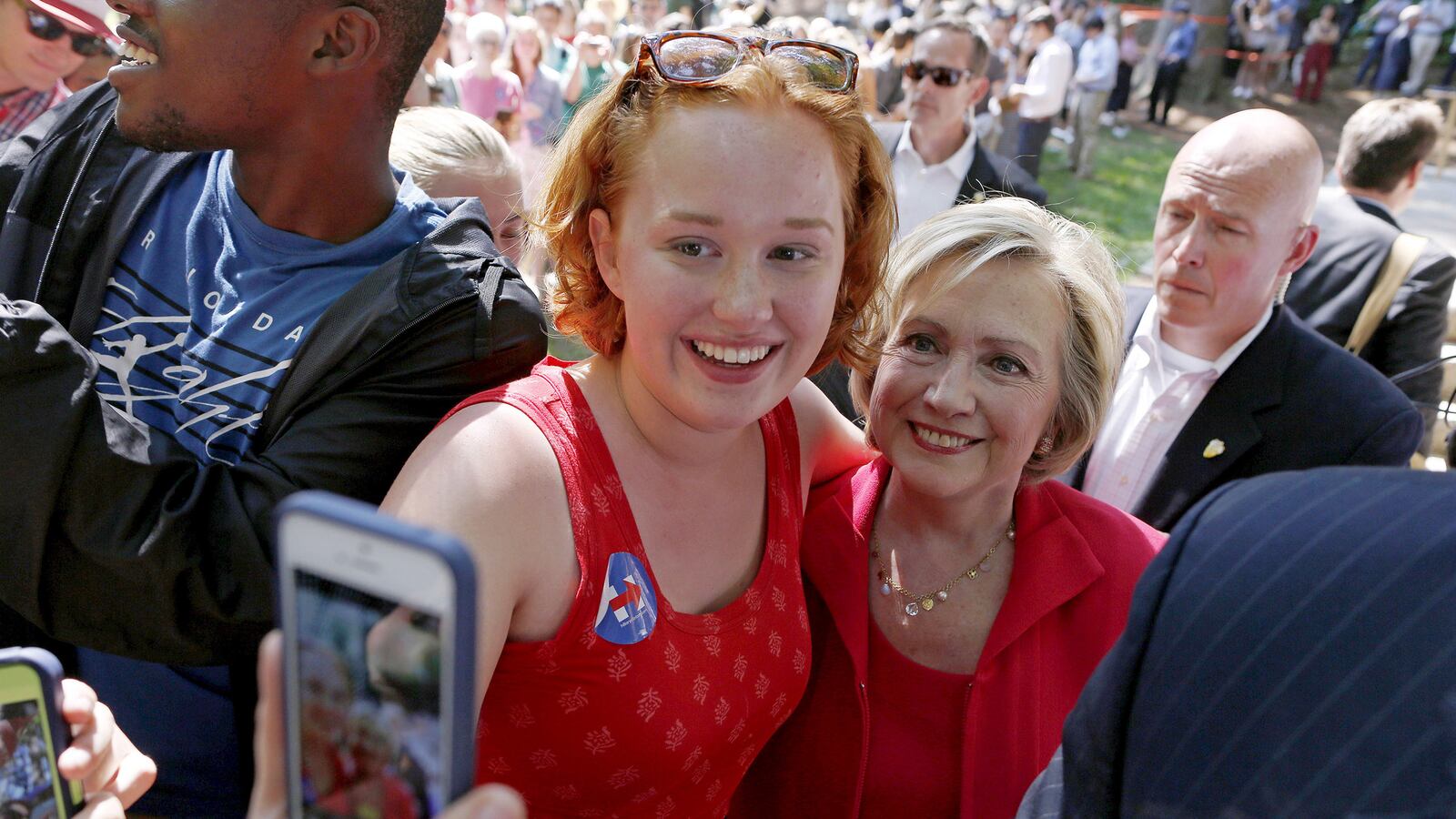The selfie may have started as a silly trend, but today it provides the portrait of a generation. And the rise of the selfie on the campaign trail highlights a rising young electorate that is turned off by phoniness and glossy perfection and is seeking to genuinely connect with candidates as real people.
Last Sunday, The New York Times covered the on-the-trail phenomenon of voters trying to snap a selfie with candidates. Some, like Jeb Bush, seem generally game; others, like Ben Carson, warn that selfies are dangerous and distracting and that since the first selfie debuted (in the 1830’s, no less) its all been “downhill.”
The idea that this election will be “the selfie election” may seem frivolous or beneath what our nation’s politics should stand for, a sign of the Kardashian-ification of elections. Columnist Kathleen Parker has bemoaned the showing-off and bragging that social media has injected into politics, and Daily Caller editor Jamie Weinstein summarized his thoughts thusly: “You should only vote for a candidate who refuses to participate in a selfie as a matter of principle.”
In reality, selfies are mostly a matter of speed and convenience, cutting out the need to beg someone else to take the photo. But there’s something about selfie-mania that I think actually tells us a lot about how people—particularly the millennial generation—wants to engage in politics these days.
Look to pop culture: the celebrities who have built the best online followings haven’t done so with perfectly manicured photo ops, but rather with goofier, more candid pics that make fans feel connected. (My favorite of these is of Anna Kendrick, splicing two red carpet glamour shots next to a full-length photo of Kendrick in footie pajamas, captioned “truth in advertising.”)
The personalities that are on the rise these days aren’t the ones who appear carefully managed, constantly airbrushed, and distant; they’re the ones who, like Kendrick, appear to open a genuine window into their own lives and invite fans and followers in.
And yet, prior to this “selfie election,” the photo op perfected by most politicians was the grip-and-grin: staged, repetitive, and far from personal. Anything a little rougher around the edges, less pristine and perfectly packaged, is generally eschewed. Hopefully candidates are finally recognizing the drawbacks to this approach. Take the documentary Mitt, which caught Mitt Romney in less polished moments doing things like ironing his own suit while he was wearing it; this intimate, candid, personal take on him was kept under wraps until after the election had long passed. Had it come out before, it would have helped humanize him.
It’s an understatement to say today that people don’t trust politicians. Poll after poll shows voters—particularly young voters—feel disconnected from politics and don’t trust government leaders to do the right thing. They take the view that political leaders are terrible, that running for office isn’t a noble pursuit, that our parties and our media aren’t to be trusted. They see ads on TV or a candidate spouting well-worn talking points and tune out. They pick up on inauthenticity and recoil from it accordingly.
The selfie, for better or worse, tears down that wall, even if just for a moment. I met this person. They cared enough to take a picture with me. Politicians may live inside a bubble, but selfies let voters feel like they pierced that bubble, and particularly for young voters—who are often ignored, especially by Republicans—that feeling can be meaningful. And the fact that the feeling can be shared with the click of a button makes it all the more powerful.
It’s no secret that Republicans have been particularly bad at courting disillusioned and disaffected younger voters in recent elections. In the 2012 presidential election, Mitt Romney lost the under-30 vote by a 23-point margin; this represented only a modest improvement over the 2008 blowout that John McCain suffered among young voters. With millennials on track to expand their footprint, representing at least one out of every five voters in this coming election, Republicans can’t afford a similar disaster.
Someone who turns 18 next year, in time to cast a ballot in the 2016 election, has a whole lifetime of voting ahead of them. If they live into their 80s, that’s voting until at least the election of 2076. And for those millennials who enter the political process thinking that Republicans operate in a totally different universe than they do, culturally and technologically, that attitude is unlikely to fade away, even as they age.
While snapping selfies with younger voters won’t entirely solve the GOP’s problems with millennial voters, at least it’s a start. And in contrast with the highly managed, closed off Hillary Clinton campaign, a more open, authentic, and personal candidate is just what Republicans will need in order to get a new generation to open their minds to a point of view they’ve tuned out before. When Mastercard is planning to allow selfies to stand in as identification when making purchases, and when candidates from Dubuque to Nashua are stopping to pose for selfies on the trail, it’s time to take the selfie—and the “selfie vote”—a little more seriously.
So smile for the camera, folks. The “selfie vote” is here to stay.






